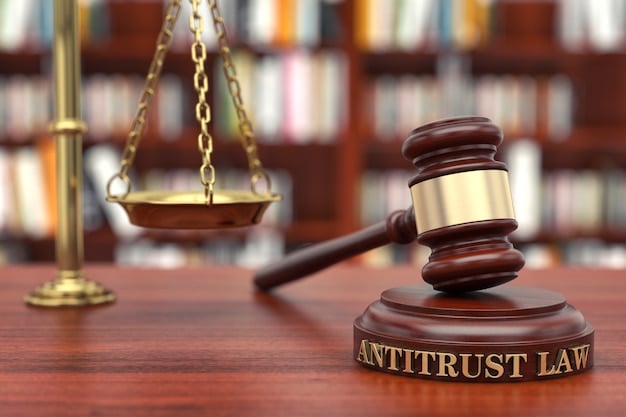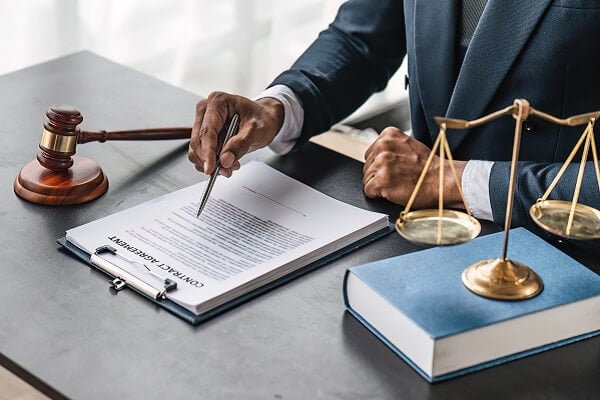The digital revolution has brought about unprecedented innovation and convenience, but it has also led to the consolidation of immense power in the hands of a few dominant technology companies. The so-called “tech giants”—Google, Apple, Facebook (Meta), and Amazon—have grown to a size and influence that rivals nation-states, creating a new and complex frontier for legal and regulatory scrutiny. Antitrust Law: Tech Giants is a burgeoning field that seeks to re-evaluate and reshape competition law for the digital age. This article will provide a comprehensive look into the core legal challenges posed by these companies, the new legal theories being developed, and the strategic implications for governments, businesses, and consumers. We will explore how legal systems are grappling with issues of monopoly power, data as an asset, and network effects, offering a deep dive into how competition law is being modernized to ensure a level playing field in the digital economy.
The Fundamental Challenge

Traditional antitrust law, developed in the industrial age, was primarily focused on preventing monopolies that harmed consumers through higher prices. Tech giants, however, often offer services that are free or low-cost, forcing regulators to rethink the very definition of harm.
A. The Monopoly Power of Data: For tech giants, data is the most valuable asset. Their ability to collect, analyze, and leverage vast amounts of user data gives them a unique competitive advantage that is difficult for new entrants to challenge.
- The “Data-Driven” Monopoly: The legal question is whether the control of this data constitutes a new form of monopoly power. Regulators are arguing that this data advantage creates a “moat” around a company’s business, making it nearly impossible for a new company to compete. This is a new legal theory, as traditional antitrust law did not consider data a monopolizable asset.
- The Harm to Consumers: The harm to consumers is not necessarily higher prices. It can be a loss of privacy, a reduction in the quality of service, or a lack of choice. This broader definition of harm is a key part of the modern antitrust debate.
B. Network Effects and Market Dominance: Network effects occur when the value of a product or service increases as more people use it. For tech giants, this dynamic creates a powerful cycle of growth and dominance.
- The “Winner-Take-All” Economy: The legal challenge is that these network effects often lead to a “winner-take-all” economy, where a single company dominates a market. This is a natural part of a network-based business model, but it can also be a barrier to competition.
- Antitrust Scrutiny: Regulators are looking at how to use antitrust law to address the anticompetitive effects of network effects, such as a company using its dominant position in one market to gain an advantage in another. For example, a social media company using its massive user base to launch a new e-commerce service.
C. Acquisitions and the “Kill Zone”: Tech giants have a history of acquiring smaller, innovative companies that pose a potential competitive threat.
- “Preemptive” Acquisitions: Regulators are now scrutinizing these acquisitions with a new level of skepticism. They are arguing that these are often “preemptive” acquisitions designed to “kill” a potential competitor before it has a chance to grow. This is a new legal theory, as antitrust law traditionally only focused on acquisitions that led to a clear reduction in market competition.
- The “Kill Zone” Analogy: The term “kill zone” is used to describe the area around a dominant tech company where new startups are unlikely to succeed because they will either be acquired or crushed by the larger company. The goal of modern antitrust law is to protect this zone of innovation.
The New Legal Theories and Enforcement Actions
The legal response to tech giants’ power is a mix of new legal theories, aggressive enforcement actions, and a push for new legislation.
A. The “Break Up” Debate: One of the most radical and widely discussed proposals is to use antitrust law to break up the tech giants.
- The Legal Precedent: The legal precedent for this is the breakup of AT&T in the 1980s. The argument is that these companies are so big and so powerful that the only way to restore competition is to break them into smaller, independent entities.
- The Practical Challenges: The practical challenges of this are immense. It would be difficult to determine where to draw the lines, and it could disrupt services that millions of people rely on every day.
B. The “Regulation” Approach: Another approach is to use new regulations to address the specific problems created by tech giants.
- Data Portability: Regulations could mandate that a tech giant must make it easy for a user to take their data and move it to a competitor. This would reduce the “lock-in” effect of network effects and make it easier for new companies to compete.
- Interoperability: Regulations could also mandate that a tech giant’s services must be interoperable with a competitor’s. For example, a messaging service would have to be interoperable with a rival’s. This would also reduce the “lock-in” effect.
C. Aggressive Enforcement and Lawsuits: Regulators around the world are no longer afraid to take on the tech giants in court.
- DOJ and FTC Lawsuits: In the U.S., the Department of Justice (DOJ) and the Federal Trade Commission (FTC) have filed major lawsuits against tech giants, alleging that they have engaged in anticompetitive behavior. These lawsuits are a clear signal that the era of laissez-faire regulation is over.
- The European Union’s Role: The EU has been at the forefront of this, with a history of levying massive fines against tech giants for anticompetitive behavior. The EU’s Digital Markets Act (DMA) and Digital Services Act (DSA) are new pieces of legislation that aim to create a more level playing field.
D. The “Essential Facility” Doctrine: A new legal theory being applied to tech giants is the “essential facility” doctrine.
- What is an “Essential Facility?”: The doctrine holds that if a company controls a resource that is essential for a competitor to compete, it must make that resource available on fair and reasonable terms. Regulators are arguing that a tech giant’s app store or search engine is an “essential facility” and that they should not be able to use their control over it to harm competitors.
The Strategic Implications for Businesses and Consumers

The shakeup in antitrust law has significant implications for businesses and consumers alike.
A. For Businesses:
- New Opportunities: The new push in antitrust law is creating new opportunities for startups and small businesses. If the tech giants are no longer able to use their power to crush competition, it will create a more open and innovative market.
- Navigating the Regulatory Environment: For tech giants, the new regulatory environment is a major business risk. They must be prepared to navigate a complex legal landscape, with the potential for costly lawsuits and new regulations. This is forcing them to rethink their business models and their relationship with competitors.
B. For Consumers:
- The Trade-Offs: The new push in antitrust law presents a series of trade-offs for consumers. A breakup of a tech giant could lead to a less integrated and less convenient user experience. However, it could also lead to more innovation, more choice, and a greater protection of privacy.
- The Rise of “Privacy as a Service”: The new focus on data as a monopolizable asset could lead to the rise of new companies that offer “privacy as a service,” helping consumers to manage and protect their data.
- A More Equitable Economy: The ultimate goal of modern antitrust law is to create a more equitable economy, where innovation is rewarded and a few powerful companies are not able to dictate the terms of the market.
C. The Role of the Public: The public has a powerful role to play in this debate.
- Advocacy: Citizens can advocate for new laws and regulations, and they can support political leaders who are committed to a more competitive and open economy.
- Consumer Choice: Consumers can use their purchasing power to support companies that are committed to ethical business practices and fair competition.
D. The Role of the Court System: The courts are at the center of this debate. The decisions they make will shape the future of antitrust law for decades to come. The judges who are hearing these cases are grappling with a new set of legal questions that have no clear precedent. The outcome of these cases will have a profound impact on the future of the digital economy.
Conclusion
Antitrust law’s battle with tech giants is more than just a legal dispute; it is a fundamental debate about the kind of society we want to live in. It is a story of old laws being applied to new technologies, and a fundamental debate about the balance between innovation, competition, and corporate power. The era of a hands-off approach to tech giants is over. The new push in antitrust law is a clear signal that a new social contract is being forged for the digital age, one that demands more accountability, more competition, and a deeper commitment to protecting consumers and the spirit of innovation. The future of our digital economy will be defined not just by the technologies we create but by the legal frameworks we build to govern them. The journey is just beginning, and the story of antitrust law’s next chapter is one that will be written by all of us.










